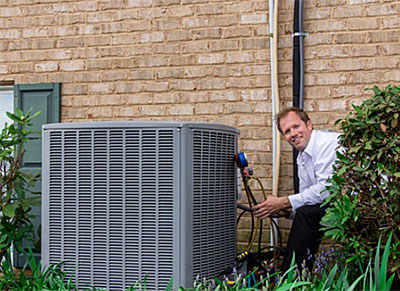The Best Time to Buy an Air Conditioner: 2019 Buyers Guide
WHEN TO BUY AND SAVE BIG ON A NEW AIR CONDITIONING UNIT
Maybe you wanted one more good summer out of that old, reliable air conditioning unit.
Maybe your central air kicked the bucket during the last part of summer, and it simply costs too much to replace.
Or perhaps you built or purchased a new home this year and need to install a new HVAC system.
People are in the market for a new HVAC system for many reasons. You may be wondering when is the best time to buy. Is spring the right time to purchase a new A/C unit, or is it cheaper during other seasons? Let’s explore how seasonal discounts can save you BIG money when buying your next HVAC system.
Does Time of Year Affect Air Conditioner Prices?
HVAC demand is at its lowest in early spring, late fall, and winter. That’s also when supply is at its highest. To encourage homeowners to buy, HVAC companies and retailers offer big discounts to customers.
So, if you’re in the market to upgrade your new central air conditioning system in New Castle County, Delaware, Southern Chester County, Pennsylvania, or Cecil County, Maryland, this year, take advantage of the huge discounts, rebates, and other incentives in the early spring and late fall. Early spring and late fall is the best time to install the new A/C system for HVAC contractors in DE, PA, or MD because they aren’t as busy.
A trusted heating and cooling company will have relationships with various HVAC suppliers. Like car dealerships, suppliers may want to move last year’s models at a significant discount to make room for new models coming out in the spring.
Don’t wait to purchase a new air conditioner during a heat wave in the summer because you’ll miss out on these amazing deals. You’ll end up in line waiting for an available install date, and prices will be back up to normal.
How Much Does A New HVAC System Cost in DE, PA, or MD?
The average cost range for an installed central air conditioning is $3,500-$7,500. Starting with low-end HVAC units at around $1,800 and upward of $10,000 for high-end A/C systems, your total cost will depend on a variety of options you choose and the selection of an HVAC contractor. The size of your home will determine the type of air conditioning system you will need.
There are several types of air conditioning systems, including:
- Window Air Condition: Window or room air conditioners cool rooms rather than the entire home or business. If they provide cooling only where needed, room air conditioners are less expensive to operate than central units, even though their efficiency is generally lower than that of central air conditioners.
- Central Air Condition: Central air conditioners circulate cool air through supply and return ducts. Supply ducts and registers (i.e., openings in the walls, floors, or ceilings covered by grills) carry cooled air from the air conditioner to the home.
- Ductless Air Condition: Ductless, mini split-system air-conditioners (mini splits) have numerous potential applications in residential, commercial, and institutional buildings. The most common applications are in multifamily housing or as retrofit add-ons to houses with “non-ducted” heating systems, such as hydronic (hot water heat), radiant panels, and space heaters (wood, kerosene, propane). Hillside Oil Heating & Cooling is a certified Mitsubishi Diamond Dealer in DE, PA, and MD.
Factors Affecting Air Conditioning Costs
Several key factors influence the cost of an air conditioning system. These factors include:
- System Type: Central air conditioning systems are generally more expensive than units designed for cooling individual rooms.
- System Size: The cost of an AC system increases with its size and capacity.
- Home Size: Larger homes necessitate more powerful and potentially costlier cooling systems.
- Labor: The installation cost of an AC system is higher for systems that are more complex or require difficult installation procedures.
Choosing the Right Unit
What Size HVAC Unit Do I Need? Here are some additional factors that will determine the size and kind of system you will need and its price.
Your HVAC contractor in DE, PA, or MD will first determine the size of your home and which kind of air conditioning system will be best for your overall comfort and energy consumption. At Hillside, we use the Manual J calculation to accurately determine how many BTUs of heating and tons of AC you need. We don’t want you to buy a central air unit that’s too big because you’ll spend too much money on the system and on your energy bills. We don’t want you to get one too small because you won’t get adequate air flowing through your home.
Air conditioning units are measured in tons or the amount of heat they can remove from a home in one hour in British thermal units (BTUs)–more information is below. The larger your house, the more cooling power you’ll need. However, bigger isn’t better in every scenario. If the system is too large, it will cycle continuously, wasting energy and emitting a loud, disruptive sound. On the other hand, if the system is too small, it will run constantly and cool your house inefficiently.
New Air Conditioning Unit Load Calculation
An air conditioning contractor will do a load calculation to determine your home’s proper central air conditioning unit. This calculation considers the climate, size, shape, and orientation of your home and its square footage. A professional will also look at the insulation, windows, walls, floors, and other materials that compose your home. He will then examine leaks, seals, and existing ducts or vents. The general rule is that every 500 or 600 square feet requires one ton of cooling. However, this calculation varies from place to place and contractor to contractor. Load calculating is often referred to as the Manual J methodology. Cooling professionals use a variety of computations to analyze your home air conditioner characteristics, determining how much air it will lose. Considering environmental considerations like geography and solar rays, professionals can decide which system will best cool your home. There are two types of Manual J load calculations:
Whole House: Provides the air conditioning load calculations for a house with an existing duct system.
Room by Room: Used for calculating the air conditioning loads in every house room, which contributes to determining individual duct sizes and the layout of a duct system.
What are EER and SEER Ratings?
The best cooling unit for your home will be the most energy-efficient and the least expensive to run. Home air conditioner professionals help determine this factor in their load calculations, but the next step is looking at the energy efficiency ratio (EER) and seasonal energy efficiency ratio (SEER) ratings of cooling units. Here’s what you need to know about these two units of efficiency.
EER Ratings
An EER certifies the cooling efficiency of HVAC units. It’s calculated by the cooling rate in British thermal units (BTUs) per hour and divided by the rate of energy input in watts at a specific temperature. The calculation goes as BTUH/WATT at dry bulb (db) versus wet bulb (wb) temperatures. The optimal rating for a cooling unit is about 80db/67wb inside and 95db/75wb outside.
SEER Ratings
An air conditioning system’s SEER is especially important if you live in a climate that changes temperature dramatically. The SEER is determined by the cooling output during the winter divided by its electric input during the winter. The higher the SEER rating, the more efficient it will be. Cooling units must have a minimum SEER of 13 as of January 2006, according to U.S. standards, so if you live in a home with a system installed before then, consider replacing it. SEER 13 units increase home efficiency by 30 percent.
Choosing an HVAC company in DE, PA, or MD
When it comes to buying a new heating and air conditioning system, it’s important to get an installer or repair company with a good reputation. Checking with the Better Business Bureau (BBB) is highly recommended as they keep a record of all complaints that have been lodged against companies.
If a company has excessive unresolved complaints, this is a good sign you may want to avoid them. Other ways to determine if you are dealing with a reputable company is to check Angie’s List, Facebook, Yelp, and other review sites. This can help you determine if people are having problems with them as well and are making negative posts on social networking sites.
Another thing you should look for is licensing, bonding, and insurance. Ask your contractor for license numbers or state and federal standing. They should be able to provide all of this documentation for you. HVAC contractors who are NATE (North American Technician Excellence) certified are some of the best in the industry. You can almost always trust a NATE-certified technician for great customer support and expert HVAC repairs and replacements.
Ask the HVAC companies bidding for the job whether or not they follow ENERGY STAR Quality Installation Guidelines. Of course, all work should also follow all federal, state, and local codes and related regulations
Conclusion
If you have a larger home with multiple rooms, it’s likely that you’ll require the installation of a central air conditioner. The cost of central air conditioning can range from $500 to $4,000, depending on various factors, including the specific unit chosen, additional installation components such as ductwork, and the rates charged by the professional installer.
On a national average, the total cost for a central AC system, including installation, comes to around $5,326. However, the typical cost range falls between $3,730 and $7,154. Lower-end central AC units may cost as little as $1,848, while high-end models can reach a price point of $10,200. It’s important to note that regional differences in the cost of living can result in significant variations in pricing across different parts of the country.
Interestingly, the cost of central air conditioning can also vary between brands, even if the internal components of the AC units are essentially the same. Many AC brands are owned and produced by the same parent company. Opting for a high-end brand might entail paying a premium price for essentially the same unit that’s available at a lower cost under a different label. Generally, high-end AC units come with additional features such as Wi-Fi integration and advanced eco-friendly capabilities, which contribute to their higher price point.
Why Choose Hillside
Hillside offers installation, maintenance, and repair services for all major central air conditioning brands, including ductless mini-split systems. We also specialize in various indoor air quality solutions, including humidifiers, air cleaners, and dehumidifiers, serving clients in Delaware (DE), Maryland (MD), and Pennsylvania (PA).

Hillside is here to help—from HVAC selection and purchase, to delivery, installation, and service, we’ll make sure your paws are comfy all year long.
New Air Conditioner Sales & Installation
It’s time to stop struggling with that fickle air conditioner unit and enjoy the benefits of installing a new Air Conditioning system from Hillside Heating & Cooling. Plus, you can reduce the high costs of summer cooling with a new, efficient air conditioning unit. With your HVAC unit’s new, state-of-the-art cooling technology, you’ll beat the heat all summer! Our air condition specialists will help you choose the best A/C system for your home’s needs while making installation as easy and affordable as possible. Hillside is New Castle County, DE, Cecil County, MD, and Southern Chester County, PA, air conditioning system experts with over 65 years of experience.
Air Conditioning Repair
Air conditioners break down unexpectedly and usually on the year’s hottest days! Hillside’s air conditioner repair techs in New Castle County, DE, Cecil County, MD, and Southern Chester County, PA, are available for emergency A/C repair services. Our technicians are trained and prepared with the know-how and parts you need to get your air conditioner running again—usually within a matter of hours! Contact Hillside Heating & Cooling now to restore your cooling needs today!
A/C Tune-Up: Air Conditioner Maintenance
Prepping your air conditioner for summer is as simple as scheduling our annual A/C Tune-Up. Hillside Heating & Cooling’s 15+ point A/C tune-up will remove any dirt and debris built up within the system throughout the year. We’ll have your air conditioning unit running efficiently! Not only will your A/C perform better, helping you save money on your utility bill, but this preventative maintenance will help you avoid unexpected breakdowns.
Ductless Air Conditioning
Ductless cooling and heating systems (sometimes called split systems, multi-split systems, or split-ductless systems) can offer your home or business unmatched energy efficiency, performance, and control for your cooling and heating needs. It’s easy to keep everyone comfortable without spending a fortune on your energy bills.
Replace your inefficient window units, space heaters, and electric baseboard heaters. Ductless cooling units can be installed in home additions, new construction, condominiums, and apartments or to improve temperature control in specific rooms. Ductless systems can even be fit for buildings that currently use ducted forced-air systems.
Heat Pump Sales & Installation
Are you looking for a way to save on your energy costs all year round? Having Hillside Heating & Cooling add a heat pump to your heating and air conditioning system is a great way to achieve this goal and much more! Heat pumps allow you to minimize the use of the central furnace while maintaining comfort within the home. New heat pump technology delivers a persistently reliable and exceptionally quiet unit.
Hillside Maintenance Plans
Replacement Parts, Inspections, Tune-Ups, Adjustments, and more. See what plan is right for your needs.
Why You Can Trust Hillside
★ ★ ★ ★ ★
“Our heater went out a few months ago. I believe the tech’ who came was Tom; long gray haired fellow. He had her fixed in no time with a new circuit board, It was a refreshing business transaction, he didn’t try to sell me stuff I did not need, I will use Hillside again, and I highly recommend them.”
– DAVE
Verified Facebook Reviews
The Hillside Maintenance Plans
Keeping Your Paws Comfy All Year Round
The Hillside Maintenance Plans are designed to prevent minor problems from turning into major issues! Extend the life of your equipment, reduce the need for costly repairs, and increase the performance of your heating and cooling systems while lowering your utility bills.



